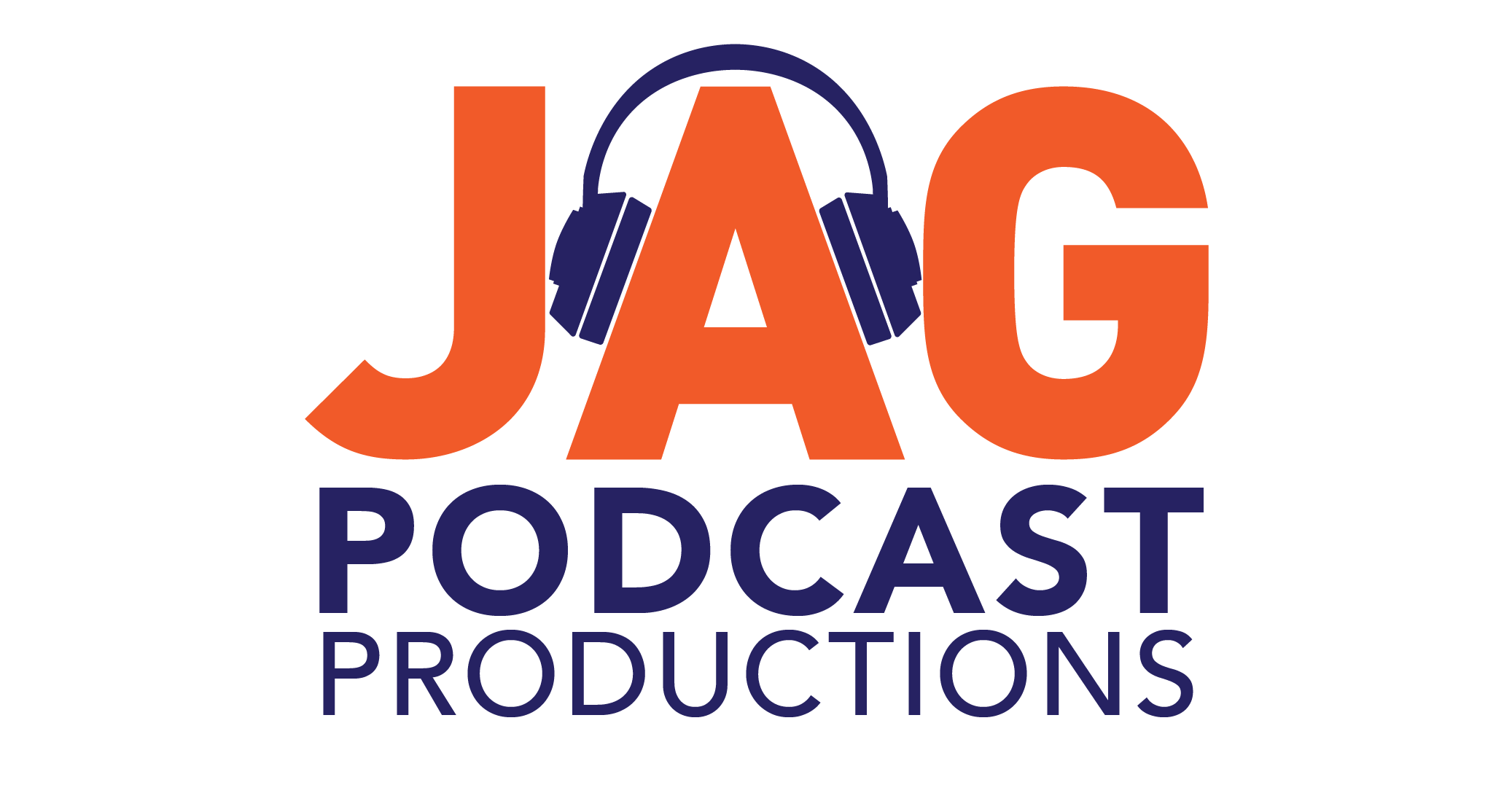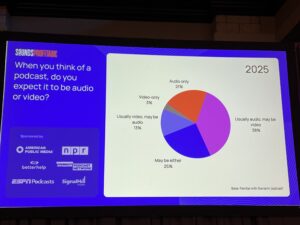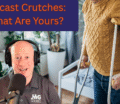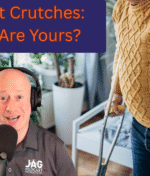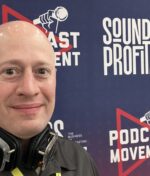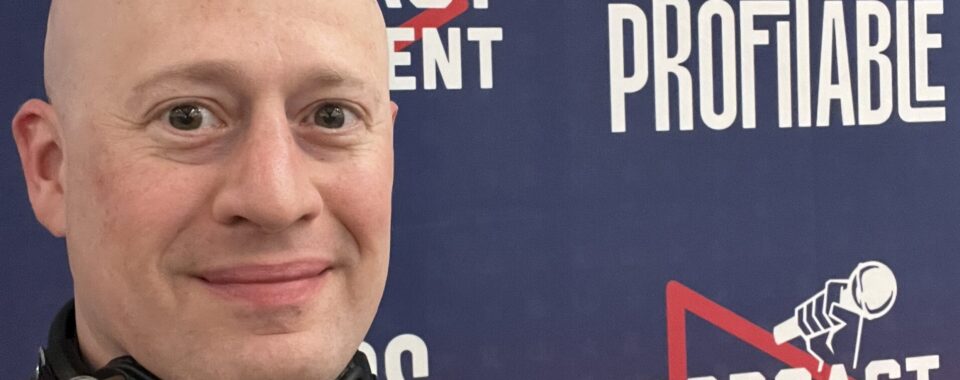
A Big Change for Podcast Movement
I’ve been attending the annual Podcast Movement convention since 2018, and it’s always a highlight of my calendar – a chance to reconnect with fellow creatives, obtain the latest industry data, and get some one-on-one time with various vendors I work with.
In recent years, the scuttlebutt among independent creators has been that the convention is shifting more toward bigger corporations, as the podcast industry grows. While I understand where that convention comes from, it’s a bit like saying your favorite independent band “sold out” because they got a record deal.
At the start of this year’s convention in Dallas, Podcast Movement announced a merger (acquisition?) of Sounds Profitable, a terrific podcast industry trade publication. They also announced that the 2026 Podcast Movement would be going in a different direction. Instead of a stifling hot summer convention at a Gaylord Hotel, which has become the norm, the event would be moving to New York City in September, to be in front of ad execs at that crucial time of year.
From 30,000 feet, the move makes sense. As podcasting continues to be the fastest growing entertainment medium, it really should be capturing a deservedly large piece of the advertising pie. This is a good move for the industry.
However, this is a bit scary for independent creators and producers. Fortunately, I was able to have a conversation with two big players in this move – Tom Webster of Sounds Profitable, and James Cridland of industry bible PodNews. I approached them after a keynote, and had a very frank but friendly chat. I told them that I understood the move to New York, but I asked them if there is still a place for folks like me at the event. Tom, to his credit, admitted that they won’t be able to accommodate everyone. After all, a week in New York will be cost prohibitive for many. However, they will be making a conscious effort to have a track and content for independents. While I’ll see how the next year plays out, my early plan is to head to the Big Apple next fall. But I’m also considering Podfest, the annual January event in Orlando, geared more toward creatives.
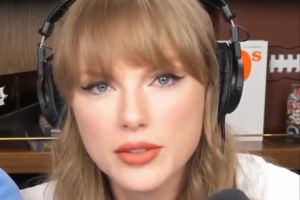
Courtesy of New Heights Podcast
If Taylor Swift Can Wear Headphones, So Can You.
One of my favorite tips from Podcast Movement was from producer/engineer Jay Yow. As a podcast producer, I often engineer and/or cohost shows for my clients. Guests are often reluctant to wear headphones – especially on video, because they are more worried about the visual. But good video will be overshadowed by poor audio. If you aren’t wearing headphones, you may miss a problem with your audio – such as the software picking up a computer or webcam mic instead of your actual microphone. And if you are recording remotely with a platform such as Squadcast, Descript, or Riverside: a lack of headphones will require you to use “echo cancellation.” This prevents your mic from picking up your cohost when they come out of your computer speaker – eliminating feedback and echo. But the problem with this, is that if two people talk or laugh at the same time, the audio will often distort or duck (meaning the volume will lower), causing weird sounds or a need to edit that part out entirely.
Jay’s point was this: If the world’s biggest pop star can wear headphones on camera, so can you and your guests.
Should My Podcast Be Video, Audio, or Both?
This is seemingly the biggest debate in podcasting – to video, or not to video. This has been especially true with the meteoric rise of YouTube as both a podcast discovery and consumption platform. But I go back to my favorite analogy, from my colleague and friend Johnny Podcasts. Audio is your shoes; video is your socks. You can go out without socks, but you can’t go out without shoes.
According to Tom Webster’s keynote, the rise in video has grown awareness around podcasting overall. In fact, 96% of Americans are at least familiar with the term, with significant numbers consuming shows monthly and weekly.
There is an increasingly large number of folks who expect podcasts to be audio OR video, and to have the option. So, yes, options are great.
So yes, options are great. But a good video podcast will not connect if the audio doesn’t land. If your resources (time, staff, and funds) are limited, focus on audio first. A number of folks are consuming audio podcasts. In fact, a significant number who consume on YouTube aren’t even watching. They are simply listening as they are driving, working at their desk, cleaning the house, walking the dog, etc.
The Podcast Study
This session, presented by Hal Rood of Strategic Solutions Research and Tim Bronsil of Point to Point Marketing, was the real highlight of the week for me. The key takeaway here was that folks really follow 3 main podcasts, but spend 75% of their time with their one favorite. So, it’s not easy to crack that top 3, but if you can, and you put out consistently good content, your listeners can be very loyal.
I was thrilled that Hal and Tim spend some time on something I preach to my clients – avoid rambling and useless chatter at the beginning of your show! And they brought the numbers to back it up.
75% of respondents in their survey want podcasters to jump right into the main topic, or at least keep the chit chat to a minimum. There’s an old adage in podcasting that the most important 30 seconds of your podcast are the first 30 seconds of your most recent episode. You only get one chance at a first impression. If Apple, Spotify, and YouTube are displaying your most recent episode first, you’d better come out of the gate strong. In your first 30 seconds, give me a reason to listen to the next 30 minutes. That can be with a “cold open” – beginning the show with a compelling clip from an interview. Or it can be a quick explainer of what I’m going to get, as a listener, out of this episode. Will I be entertained? Will I learn something? Will you pull at my heartstrings. Why should I listen beyond the first 30 seconds, when the internet gives me an infinite well of content to draw from?
If you don’t connect with your listener early, they may never come back, as seen here:
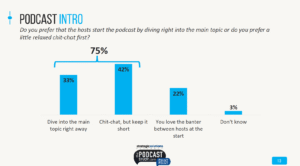
The Compromise Between Audio and Video Podcasts
For many podcasters, an audio only podcast makes sense. But even if you are doing audio-only, it may be beneficial to record the video as well. Even if you’re not editing and publishing a full video interview, you can take short, compelling clips, and use them on social media – as YouTube shorts, TikToks, and Facebook/Instagram Reels. These clips are driving discovery, and reminding listeners about your show, as evidenced by this graph from Hal and Tim.
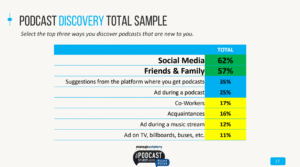
Never, Ever, Use a Service to “Buy” Downloads – They Are Scams!
Each year, I enjoy the chat from Rob Walch of podcast hosting service Libsyn. While he remains more focused on the audio side, he always brings great overall industry insights. Perhaps his biggest point was never to buy into these spammers and scammers that offer paid downloads. Often, they will approach you, offering you tons of downloads so you can monetize your show and sell ads. These downloads are often from “bot farms” and are not real people. If your show has a huge spike in downloads, that’s a red flag that it’s artificial. And the minute you stop paying for that service, they turn off the faucet, and you come crashing back down to earth. A slow, steady growth is the way to go. Put in the work and avoid shortcuts. Rob said if he sees a ratio of downloads to users of greater than 2.5 to 1, that’s a sign the downloads aren’t real.
Perhaps my favorite slides from Rob each year are aimed at the folks who are intimidated to get into the podcast space because there’s too much competition. A quick Google search will tell you there are 4.6 million podcasts out there. But how many are actually active? Meaning, how many have made it to 10 episodes and released content in the last 90 days? Try 354,000 – less than 10%.
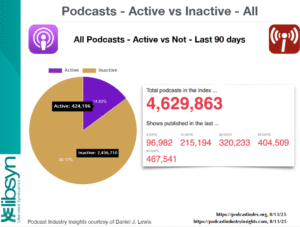
And if you compare that number to the total blogs on the internet, there are 2,000 blogs out there for every one active podcast. Have you ever heard someone say “I’m not going to start a blog because there are too many other blogs out there?”
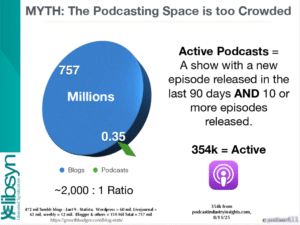
Podcast SEO (Search Engine Optimization) and PSO (Podcast Search Optimization)
On the final morning of Podcast Movement, I went to sessions on SEO and PSO – and they are two very different animals! SEO, as you may know, is Search Engine Optimization – or how well you will show up in results on Google, and now Chat GPT as well. For SEO, you are going to want specific episodes to show up – as opposed to your podcast as a whole. With a nod to my background in radio, think of your podcast as your album, and your best episodes as your radio singles. These are the ones you want to highlight – the “gateway drug” to your show, if you will. The advice from Bruce Chamoff of World Podcast Network is to really focus on 3 shows that you want to rank in Google results. And keep these things in mind.
Google will display the first 55 characters, usually about 7 words. Make them count!
Only use this real estate for a guest’s name if they are big enough to be searchable. Taylor Swift? Yes. Jon Gay? No. I’m not sure I 100% agree with that, but it’s something to consider.
Use back links! Google loves back links! In your show notes, link to your previous and next episode.
Use tools like Google’s keyword planner and “people also ask.”
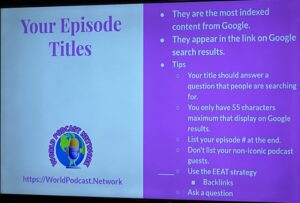
As far as Chat GPT, its “crawler” is often blocked by podcast hosts, so be sure to do a blog post on your website that has all your show notes. And don’t be afraid to use that 4,000-character limit!
And finally, PSO -or podcast search optimization. This one’s not as important, but it’s worth mentioning. Unlike Google and Chat GPT, Apple and Spotify are likely to display your full show. Rob Walch says that Apple’s priorities for search are SHOW TITLE, Author, then number of followers (what we used to call subscribers) all time.
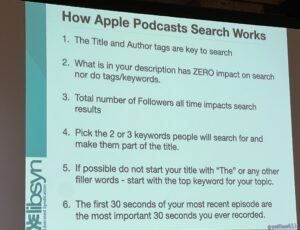
According to Courtney Elmer of PodLaunch, Spotify will prioritize shows that have published content in the last 15 days. That’s why consistency is key. And while I got conflicting information about just how important it is to rank in Apple and Spotify charts, Courtney makes a good point. Would you rather someone search and find you, or your competition?
